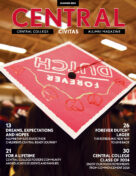
Wisdom demands more than questions with simple answers.
The task of education is not fundamentally about finding answers. Our most meaningful work is about asking questions. Great questions yield answers that in turn help us ask even better questions. When we are very young, questions dominate our interaction with the world. The extent of our curiosity, at first charming to our parents, gradually becomes annoying. Too early in life we receive the social signal that questions frustrate others, dampening our natural instinct to explore our surroundings through our questions. By the time we reach grade school, we grow anxious when our genuine interest in learning about something might cause us to ask a “dumb question.” The result is intellectual retreat, rather than the aggressive pursuit of new information.
As students arrive on a college campus, they are often preoccupied with obtaining the right answer by the most efficient means possible. The focus is on information gathering, memorization and reporting. The faculty plays the principal role in enabling students to elevate the discourse above the adolescent tendency toward simple answers. They are aided by academic deans, student development staff, coaches and community partners, among many others.
The most rewarding experience for an educator is to hear a student ask a better question. It signals a change in appetite from simple information to the complexities of knowledge and understanding. Here we begin to see the emergence of opinion, ideas, discernment and judgment. I have often thought this process is restorative by nature as we find ways of gradually educating students back to the innate tendency to learn by asking questions. Our greatest success as educators may be found in this one task alone. If our students graduate with the courage to ask better questions, there is a greater possibility we can set them on an even more important path – the pursuit of wisdom.
It sounds overly ambitious. Pursuing wisdom seems like a lofty idea reserved for the few contemplative souls in our society. I would argue, however, that wisdom is the eventual goal for any learning community. It is not something that can be achieved solely in a college setting with those experiencing late-adolescence and early adulthood. Yet we must do our task well at this stage to make a journey toward wisdom more likely. It begins with modeling the hard work of asking better questions.
The experience of learning is a lifelong pursuit. Many of us who are more senior realize that as the years of life pass we know less and less. The body of knowledge is expanding at an exponential rate. Even apprehending, much less comprehending, the information and knowledge of a single academic discipline is well beyond our reach. Wisdom becomes a far more worthwhile pursuit. For in the absence of wisdom we form rigid ideologies rooted in limited information and inadequate knowledge.
Our society needs more wisdom. It begins with giving permission to our students to ask better questions.












To encourage serious, intellectual discourse on Civitas, please include your first and last name when commenting. Anonymous comments will be removed.
Comments are closed.